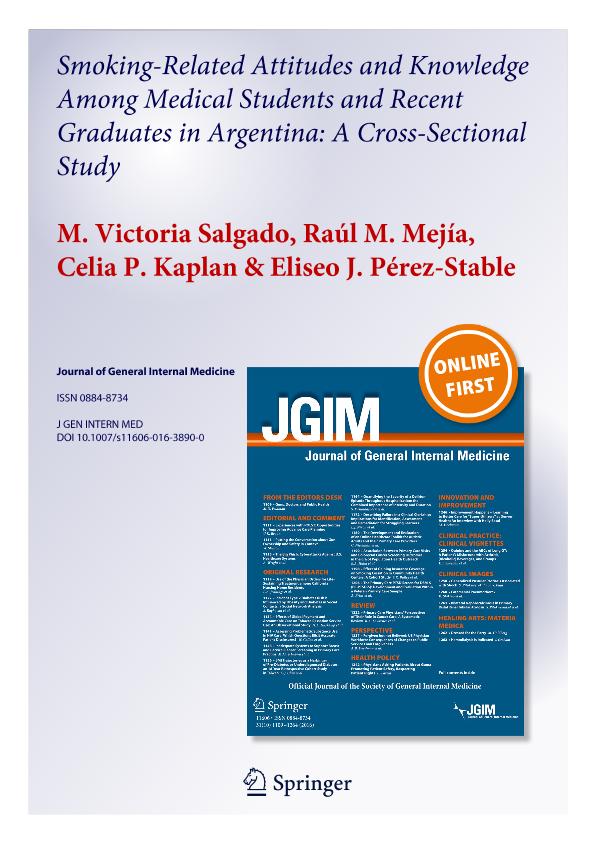Mostrar el registro sencillo del ítem
dc.contributor.author
Salgado, Maria Victoria

dc.contributor.author
Mejia, Raul Mariano

dc.contributor.author
Kaplan, Celia
dc.contributor.author
Perez Stable, Eliseo
dc.date.available
2020-09-11T20:34:26Z
dc.date.issued
2016-06
dc.identifier.citation
Salgado, Maria Victoria; Mejia, Raul Mariano; Kaplan, Celia; Perez Stable, Eliseo; Smoking-Related Attitudes and Knowledge Among Medical Students and Recent Graduates in Argentina: A Cross-Sectional Study; Springer; Society of General Internal Medicine; 32; 6-2016; 549–555
dc.identifier.issn
1525-1497
dc.identifier.uri
http://hdl.handle.net/11336/113845
dc.description.abstract
BACKGROUND: Physicians in Argentina smoke at rates similar to the general population, and do not have a clear role in tobacco control strategies. OBJECTIVE: To describe the attitudes and knowledge of medical students and recent graduates towards smoking behavior in Argentina. DESIGN: Cross-sectional self-administered online survey conducted in 2011. PARTICIPANTS: Medical students and recent medical graduates from the University of Buenos Aires. MAIN MEASURES: Attitudes and knowledge were evaluated by responses to 16 statements regarding the effects of smoking cigarettes and the role of physicians in tobacco control. Rates of agreement with a full ban on indoor smoking in different public settings were assessed. KEY RESULTS: The sample included 1659 participants (response rate: 35.1 %), 453 of whom (27.3 %) were current smokers. Only 52 % of participants agreed that doctors should set an example for their patients by not smoking, 30.9 % thought that medical advice had little effect on patients’ cessation behavior, and 19.4 % believed that physicians could decline to care for smoking patients who failed to quit. In adjusted logistic regression models, current smokers had less supportive attitudes about tobacco control and were less likely than non-smokers to agree with a full indoor smoking ban in hospitals (OR: 0.30; 95 % CI 0.16–0.58), universities (OR: 0.55; 95 % CI 0.41–0.73), workplaces (OR: 0.67; 95 % CI 0.50–0.88), restaurants (OR: 0.42; 95 % CI 0.33–0.53), cafes (OR: 0.41; 95 % CI 0.33–0.51), nightclubs (OR: 0.32; 95 % CI 0.25–0.40), and bars (0.35; 95 % CI 0.28–0.45). Recent medical graduates had more accurate knowledge about cessation and were more likely to agree with a full smoking ban in recreational venues. CONCLUSIONS: Although most participants reported a strong anti-tobacco attitude, a proportion still failed to recognize the importance of their role as physicians in tobacco control strategies. Current smokers and current students were less likely to support indoor smoking bans. Specific educational curricula could address these factors.
dc.format
application/pdf
dc.language.iso
eng
dc.publisher
Springer

dc.rights
info:eu-repo/semantics/openAccess
dc.rights.uri
https://creativecommons.org/licenses/by-nc-sa/2.5/ar/
dc.subject
SMOKING
dc.subject
MEDICAL STUDENTS
dc.subject
ATTITUDES
dc.subject
LATIN AMERICA
dc.subject.classification
Salud Pública y Medioambiental

dc.subject.classification
Ciencias de la Salud

dc.subject.classification
CIENCIAS MÉDICAS Y DE LA SALUD

dc.title
Smoking-Related Attitudes and Knowledge Among Medical Students and Recent Graduates in Argentina: A Cross-Sectional Study
dc.type
info:eu-repo/semantics/article
dc.type
info:ar-repo/semantics/artículo
dc.type
info:eu-repo/semantics/publishedVersion
dc.date.updated
2020-09-11T18:50:00Z
dc.journal.number
32
dc.journal.pagination
549–555
dc.journal.pais
Estados Unidos

dc.description.fil
Fil: Salgado, Maria Victoria. Centro de Estudios de Estado y Sociedad; Argentina. Universidad de Buenos Aires. Facultad de Medicina; Argentina. Consejo Nacional de Investigaciones Científicas y Técnicas; Argentina
dc.description.fil
Fil: Mejia, Raul Mariano. Centro de Estudios de Estado y Sociedad; Argentina. Consejo Nacional de Investigaciones Científicas y Técnicas; Argentina
dc.description.fil
Fil: Kaplan, Celia. University of California; Estados Unidos
dc.description.fil
Fil: Perez Stable, Eliseo. National Institutes of Health; Estados Unidos
dc.journal.title
Society of General Internal Medicine
dc.relation.alternativeid
info:eu-repo/semantics/altIdentifier/url/http://www.readcube.com/articles/10.1007/s11606-016-3890-0?author_access_token=MVTbCNuX1gg7TaImQ1JkmPe4RwlQNchNByi7wbcMAY4nRSzxISfEx5-BbI72wfzxFf9Thqf32o0UEXML4PpKnFcCzsBM1otBclx7MvtuGmK8lbeLLkJi-3QgHOlHsQyD3z-TvWHD5FhTj78i8pm_sQ%3D%3D
dc.relation.alternativeid
info:eu-repo/semantics/altIdentifier/doi/http://dx.doi.org/10.1007/s11606-016-3890-0
dc.relation.alternativeid
info:eu-repo/semantics/altIdentifier/url/https://www.ncbi.nlm.nih.gov/pmc/articles/PMC5400752/
Archivos asociados
